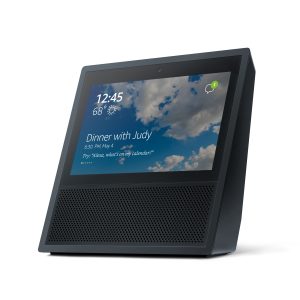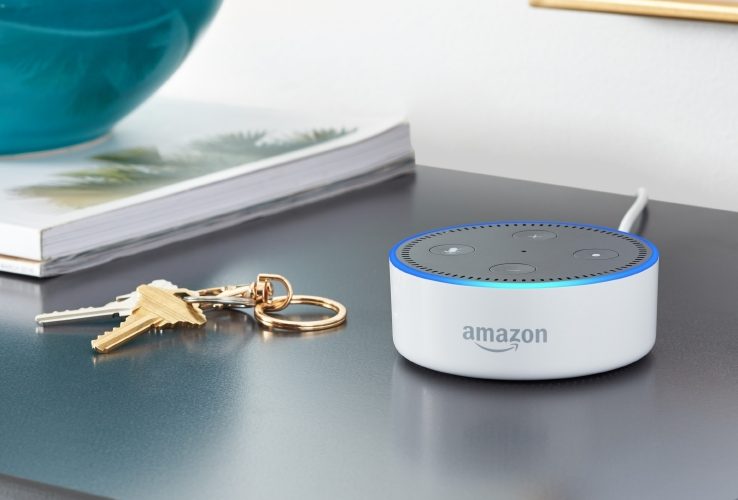Smart homes for seniors? The two make an unlikely match—but one CABHI-funded project is evaluating how living in a smart home could improve quality of life for older adults with early-stage dementia.
Victoria, BC-based geriatrician Dr. Marilyn Malone and professor of nursing Dr. Debra Sheets are spearheading a new study called Ease e-Home. They’re developing a customizable, low-cost smart home using Amazon Echo—which connects to smart devices around the home—to support older adults with dementia and their caregivers.

The video-enabled Amazon Echo Show is one of the Ease e-Home smart devices. It can be used to video-call friends and family, play music and display lyrics, etc.
“Ease e-Home has tremendous potential for people with early-stage dementia or memory loss who want to continue living in their homes,” says Dr. Sheets. “Our hope is that it’ll make it easier to maintain social connections and improve quality of life by helping people continue doing the activities of daily living.”
Amazon Echo uses digital assistant Alexa to set reminders, make calls, play music and games, answer questions, and control lighting and motion sensors—all by voice command. Its ease of use makes Echo a promising option for seniors who may have trouble carrying out these kinds of tasks manually, but still want to live independently.
Smart technology to help strengthen social connections
One powerful benefit of a smart home is the opportunity for older adults living alone to preserve social connections.
“People with dementia get isolated, and it’s not always easy for them to figure out how to make a phone call,” Dr. Sheets says. “If we can teach them to say something like, ‘Alexa, call my daughter,’ and they know they can reach their daughter, that’s a really good thing.”
A common behaviour of those living with dementia is asking repetitive questions, which can alienate friends and frustrate caregivers—but, as Dr. Sheets says, voice-assisted technology never loses its patience.
For caregivers, Ease e-Home could provide more peace of mind. In the event of a fall, they’ll know their loved one can call for help immediately just by using their voice. Caregivers will also be able to monitor the actions of the older adult through the smart home system without the invasiveness of a video camera.
“Caregivers can be reassured – they’ll know you got up and opened the refrigerator, or that you didn’t wander out the front door in the middle of the night,” Dr. Sheets says. “It allows a caregiver to do all that without having to drive across town to check on their parent.”

Dr. Marilyn Malone

Dr. Debra Sheets
CABHI trial to accelerate validation
Drs. Malone and Sheets are leveraging nearly $50,000 in funding from CABHI’s Spark Program, which supports early-stage innovations, in order to test the project. They’ll be implementing the smart home for a four-month period in 15 homes of community-dwelling seniors with early-stage memory loss or dementia and their family caregivers.
“I really appreciate the speed with which CABHI makes innovative research happen in just a few months,” says Dr. Sheets. “Other research funding cycles typically take a year.”
“It’s quite impressive to have this level of attention and support to ensure the project gets going,” adds Dr. Malone.
The trial aims to provide scientific validation of the solution’s benefits, as well as identify any challenges and barriers affecting the caregivers and the older adults using the technology. Drs. Malone and Sheets hope to use the results of the CABHI-funded trial to support the distribution of Ease e-Home to Canadians across the country.
“Ease e-Home could be the thing that delays older adults with dementia living in the community from transitioning to higher levels of care,” says Dr. Sheets. “I think it could have a significant impact on healthcare costs.”
Dr. Malone hopes that by using technology to enrich the lives of those living with early-stage dementia, Ease e-Home will help fight the stigma associated with the condition.
“You can tell a patient they have a major neurocognitive disorder and they can accept that. But once you start using words like ‘dementia’ or ‘Alzheimer’s disease,’ you see this shift in how they’re processing the information,” she says. “I think the use of technology to help people, and have people use technology despite having a diagnosis with stigma around it, is going to help.”


